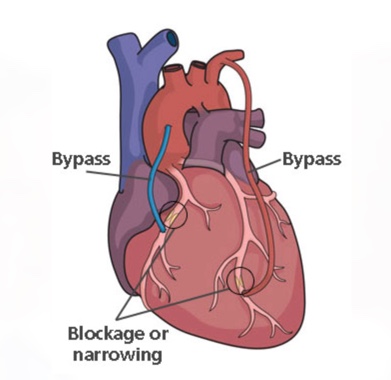
Coronary artery bypass surgery is a heart procedure that uses a graft of a blood vessel from another part of the body to redirect the flow of blood around a blocked artery. If an artery wall becomes hardened or blocked, blood can no longer deliver oxygen unobstructed to the rest of the body, causing a variety of unpleasant symptoms and putting the patient at an increased risk of a heart attack. Coronary bypass surgery is a common heart procedure to treat a severe hardening or blockage of the arteries.
Arteries: The highways of the heart
Arteries play the vital role of providing passageways for oxygenated blood to flow from the heart to the rest of the body. Unfortunately, just as a highway for cars may wear down and degrade over time, arteries too are susceptible to a number of illnesses that can block the flow of blood. With age and lifestyle factors, arteries may harden and lose their elasticity, become clogged with cholesterol or plaque, or grow narrow (stenotic) over time.
Treatment for diseases of the arteries often begins with medication or diet and lifestyle changes. In more severe cases, however, surgical intervention may be required.
There are several surgical options to treat arterial conditions, including angioplasty procedures such as stents, rotablation and balloons, or coronary bypass operations. While implanting a stent is usually less invasive than a coronary bypass operation, it may not be as effective as open heart surgery in treating more severe cases. A qualified heart specialist will make a recommendation for treatment based on the details of each individual case, including the severity of the condition and the patient’s overall health.
Rerouting the paths from the heart
Coronary bypass is usually performed as open heart surgery, meaning the procedure is performed via a large incision in the chest. The patient will be placed under general anesthesia, the heart will be stopped, and a heart-lung machine will be used to keep oxygen flowing throughout the body. A blood vessel will be harvested from another part of the body, then grafted onto the diseased artery. This allows blood to bypass the diseased part of the artery via the new, grafted vessel so that it can flow freely from the heart.
Depending on the severity of the disease, anywhere from one to five arteries may need to be grafted during a single surgery.
Minimally invasive options
Fortunately for some patients, new surgical techniques have been developed to make coronary bypass surgery less invasive. In one variation, the heart surgeons do not stop the patient’s heart, and the patient does not need to be connected to a heart-lung machine during surgery. Another option is for the operating surgeon to create several small incisions around the chest instead of one large incision in the middle to access the diseased arteries.
While minimally invasive heart surgery gives patients hope for treatment even if they are too fragile to undergo traditional open-heart surgery, it may not be an effective treatment option in all cases. Only a highly trained heart specialist can make an informed recommendation about which technique is best for each individual case.
Some of the German heart specialists working at high-quality cardiology centers within Premier Healthcare’s network are leading experts in performing minimally-invasive heart operations.
Risks and complications of coronary artery bypass
Coronary bypass surgery is a standard surgical procedure with a relatively low risk of complications when performed by an experienced surgeon. Still, there are many risks to be aware of before making the decision to undergo open heart surgery. Patients may experience a temporary or permanent cognitive decline after surgery. They may suffer a heart attack or stroke afterwards. And general risks of open surgery, such as infection, anesthesia-related complications, or failure to improve symptoms, can occur.
Why Germany?
German cardiologists and heart surgeons are renowned specialists for the treatment of all sorts of cardiovascular diseases. Developments in heart surgery in particular have lead medical professionals to adopt a multidisciplinary, patient-centered approach to provide the best possible care.
Today, many heart procedures are performed by a multidisciplinary team of specialists in hybrid operating facilities. Cardiologists, cardiovascular surgeons and anesthesiologists work together to combine their specialized knowledge to provide patients with comprehensive treatment and care.
Premier Healthcare Germany has some of Germany’s top heart clinics in its network. To find out more about heart procedures in Germany, contact us via our website or phone.
